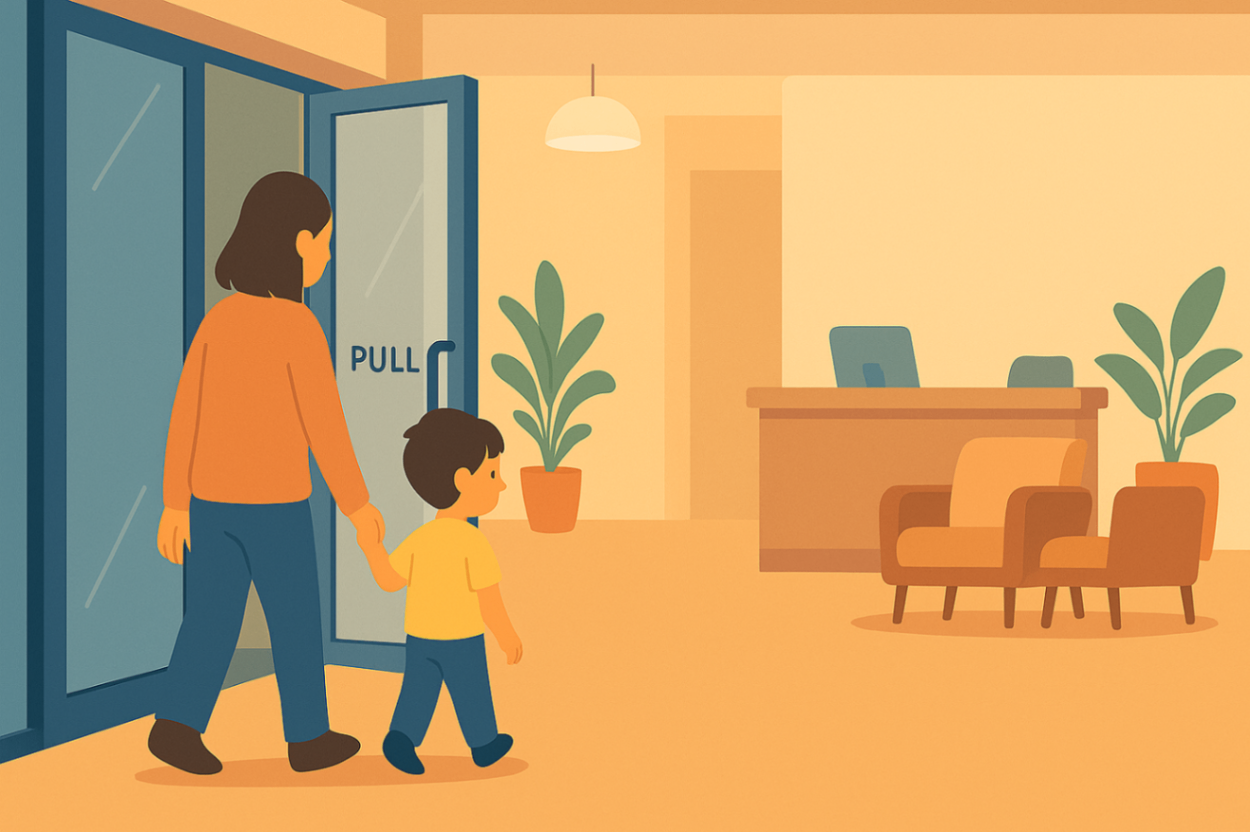
what to expect in your child’s first behavioural therapy appointment
23 June, 2025

Key Highlights
-
Cognitive Behavioural Therapy (CBT) during the first session helps identify challenges and formulate treatment goals for mental health problems like anxiety and bipolar disorder.
-
Your child’s first appointment opens the door to mental health support, focusing on goal setting and creating a structured treatment plan with a qualified therapist.
-
Clinicians prioritise building rapport and confidentiality while assessing behaviours and the starting point of the therapeutic process.
-
Parents are encouraged to prepare for paperwork, understand eligibility requirements, and collaborate with service providers.
-
Behavioural therapy sessions equip children with new skills, improving their wellbeing while addressing specific mental health concerns.
Introduction
Starting behavioural therapy for your child can feel overwhelming—especially if it's your first time navigating mental health support. But knowing what to expect during the first appointment can help ease uncertainty and set the stage for a positive experience. The initial behavioural therapy session is more than just an introduction; it’s a vital opportunity to share your concerns, explore your child’s behaviours, and begin developing a personalised treatment plan.
During this first appointment, the therapist will take time to understand your child’s developmental history, emotional needs, and current challenges. You’ll work together to set goals that support your child’s wellbeing, learning, and daily functioning. Whether you're seeking support for anxiety, ADHD, autism-related behaviours, or social and emotional issues, this first step is a crucial part of the journey toward meaningful and lasting progress.
Preparing for the First Appointment
 Before you go to the first appointment, doing a little planning can help you and your child feel sure about what will happen. This gives you time to do any needed paperwork and to check if you meet the eligibility rules. At this time, a qualified clinician will spend some time with your child. The clinician looks at your child’s behaviour and starts to build rapport with them. As a parent, when you are ready for both the planning work and how it feels to start something new, you help make the time better for your child. Then, both of you can go into the session feeling good and open to the therapeutic process.
Before you go to the first appointment, doing a little planning can help you and your child feel sure about what will happen. This gives you time to do any needed paperwork and to check if you meet the eligibility rules. At this time, a qualified clinician will spend some time with your child. The clinician looks at your child’s behaviour and starts to build rapport with them. As a parent, when you are ready for both the planning work and how it feels to start something new, you help make the time better for your child. Then, both of you can go into the session feeling good and open to the therapeutic process.
How to Talk to Your Child About Therapy
Explaining therapy to your child takes patience and care. Try to talk about it as a helpful tool, not as a place that is only for fixing problems. Let them know they will have their own therapist. This person is a trusted adult focused on their mental health and will be there for their mental health support.
-
Tell them this is a starting point. The clinician will help them deal with any challenges that come up.
-
Talk about how they can learn new skills. These skills can make life easier and help with some mental health struggles.
-
Make sure they understand confidentiality. What is said in therapy stays private.
Talking about this with open and clear words helps set a good tone. Tell your child what the therapist does. The therapist is there to listen and to help them understand how they feel and act. You can use examples from your family discussions to help explain what therapy is about. Let your child ask any questions. When you do this, they see that therapy can be a healthy way for everyone to work together for growth and wellbeing.
Paperwork and Information You’ll Need to Bring
Gathering the right paperwork for your child's first appointment makes everything much easier. It helps set up good mental health support. You will need proof of eligibility for the services. Be sure to include your child’s preferred name. You should bring details about any registered provider or service provider who helps your child.
-
Bring identification documents and use your insurance details. If you need to, provide any records from the National Disability Insurance Agency.
-
Add medical histories, have notes on any behaviours, and bring reports on past mental health to help give a clear picture.
Get these ready before you come to avoid any rush at the time of the session. When you are open with the therapist, it helps the therapist better understand what your child needs. Being prepared with this paperwork helps everyone spend time working on your treatment goals, not on sorting out papers or other details.
How to Prepare as a Parent
Preparing to be a parent at a mental health appointment needs planning in both practical and emotional ways. Start by getting to know what the clinician does and how this person helps improve your child's wellbeing. Show the child that you believe in the therapeutic process by being positive and ready to support.
-
Find out about ways therapists use to build rapport with the child and be ready to clearly talk about your child’s mental health problems.
-
Do not put too much pressure on your child; instead, talk in a simple and calm way. This can help the child feel better and make it easier for them to open up.
Be ready for the clinician to ask you about your child’s habits, behaviour, or lifestyle. Give honest and simple answers so it is clear for the mental health professional. This will help when setting treatment goals and moving forward. Therapy might be mostly for your child, but when you also take part, you give extra support every step of the way. You are there to guide your child along with the mental health professional.
What Happens During the Initial Intake

The first session is important for therapy. At this time, the clinician will talk with you to get important details about your child’s mental health, past events, and how they act. The talk will cover confidentiality, so you and your child know that what is said stays private unless there are safety issues.
Usually, the session includes some assessments. The clinician will notice your child’s behaviour and go over any paperwork that you bring. This is the starting point to see what problems there are and to help make a plan for support. The goal at this time is to start the therapeutic process by helping your child build trust and form a good rapport with the mental health professional. Knowing that the first session is all about getting ready for change can make the process easier for both you and your child.
Assessment Tools and Behavioural Observations
During the first session, assessment tools and watching how a child acts are very important. A mental health professional will use different ways to look at the child’s behaviours and patterns. This helps them see what the child needs. All of this helps make a clear treatment plan. These checks help set goals and work on new skills. When the clinician builds rapport and promises confidentiality, the child feels safe to talk. This is a key first step in their mental health journey.
How Goals Are Set With Parents and Practitioners
Goal setting takes place together during the first therapy session. With help from both parents and the people working with the child, the treatment goals match what the child needs. These goals can be about making the child stronger or helping them learn new skills. All of this is to help improve the child’s mental health.
Parents also share what they see, which helps the clinician make a strong treatment plan. Talking openly helps make sure that the goals fit how the child acts every day and how they get along with others. By working on small, clear steps, families have an easy-to-follow path. This makes it more likely they will get to where they want to be in the end.
Questions You Can Ask During Your Appointment
The first session gives you a chance to get to know the therapeutic process. You can have an open talk with the clinician in this meeting. This will help you get answers to all your questions and understand what to expect. Here are some important things you may want to ask:
-
How many sessions will it take to reach the treatment goals?
-
What type of therapy is planned, and will it use CBT?
-
Can you explain what the confidentiality limits are?
-
Will there be help or resources for mental health support outside of therapy?
-
How do you change the treatment plan to fit what each person needs?
Talking about these things in the first session can help parents feel good about the approach. It also lets the clinician explain the reasons for using different methods and tools in the mental health process.
Our Approach to Supporting New Families
At daar Liverpool, we’re committed to creating a safe, inclusive, and supportive space for families starting their behavioural therapy journey. Our experienced clinicians follow NDIA-approved frameworks to help families determine eligibility for services under the National Disability Insurance Scheme (NDIS), and ensure each child receives the support that’s right for them.
From the very first appointment, our team takes a personalised approach—whether it’s guiding you through therapy goals, conducting comprehensive behavioural assessments, or delivering CBT-based strategies tailored to your child’s needs. We work closely with parents and carers to reduce the stress of managing treatment plans alone, offering coordinated care and clear communication every step of the way. Our Liverpool clinic also serves families in nearby suburbs like Casula, Prestons, Wattle Grove, Moorebank, and Lurnea, making access to early intervention and behavioural support more convenient for local families.
Still unsure if therapy is the right next step? Check out these early signs your child may need behavioural therapy.
Conclusion
Taking your child to their first behavioural therapy appointment is a meaningful step toward improving their wellbeing. It’s natural to feel unsure or emotional, but being informed and prepared can make a world of difference. By building a partnership between you, your child, and the therapist, you're laying the foundation for long-term success and emotional growth. If you still have questions or need extra guidance, don’t hesitate to reach out—because when it comes to your child’s mental health and happiness, every step counts.
Ready to Book Your First Appointment? Call us now.
Frequently Asked Questions
How long does a first behavioural therapy session usually last?
Usually, the first session will take about 45 to 60 minutes. In this therapy session, the mental health professional will talk with you and get some basic details. They will also discuss the type of therapy that may help you and plan how long you might need to come in. This depends on your concerns and what goals you have for your mental health.
What happens during the first behavioural therapy session?
During the first behavioural therapy session, the therapist tries to get as much information as possible. They do this by asking the family about the child’s past, the way the child acts, and how the family handles things at home. The therapist may watch the child and talk to them and their caregiver. This team effort helps set the goals for the therapy session. It also helps the therapist choose the right ways to help, so both the child and their caregiver feel supported during behavioural therapy.
Should I attend my child’s first therapy appointment?
Yes, it is good for a parent to be at the first appointment. When you are there, you help the clinician learn more about your child's mental health. You also help make a good connection between the therapist and your child. This can make the treatment plan better.
What should I bring to the first therapy appointment?
Bring all paperwork that shows your child’s eligibility and write down their preferred name. If you have any old mental health reports, bring those too. If a registered provider or the national disability insurance agency gave you documents, be sure to include them. Having all your records ready and organised will make the first appointment go smoothly.
.svg)

















